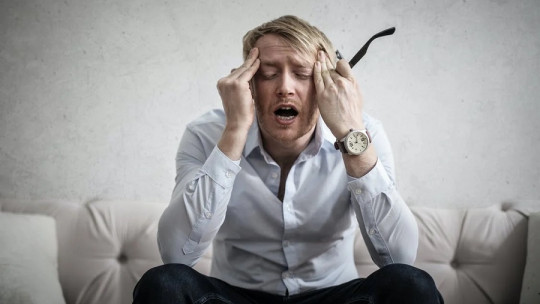
Anxiety is an experience that we have all felt on more than one occasion, but at different levels. There are people who know how to handle it and do not let it govern their lives, while others, sadly, reach their own levels of psychopathology.
Fortunately, psychotherapy is very effective for anxiety disorders, with many patients with these problems feeling a noticeable improvement in their lives.
However, the experience of feeling anxious can return. The fear of relapse into anxiety It is something widely shared by patients who suffer from certain psychopathologies, a topic that we are going to delve into below.
Fear of relapse into anxiety: what is it and why does it happen?
Although anxiety is a common experience, experienced by all people at some point in their lives, sometimes it can become so severe that it becomes a psychological problem. Anxiety has its own group of disordersmade up of General Anxiety Disorder (GAD), specific phobias, social phobia, agoraphobia and other disorders with which it is deeply related, such as selective mutism, Post-Traumatic Stress Disorder (PTSD) and Obsessive Disorder. Compulsive.
One of the main reasons why many patients with anxiety disorders relapse is that they abandon therapy prematurely, precisely because they already notice some improvement at the beginning of it. This is a great risk, because since they have not acquired all the necessary tools to deal with their problem, it happens that if the trigger for their symptoms is triggered, they relapse again and encounter the harsh and implacable reality: to overcome their anxiety They have to go through a whole process, which is neither easy nor quick.
Having a certain fear of relapse into anxiety is normal. Ironically, having this fear increases the chances of suffering more anxiety. As an emotional state that is triggered by any stressor and worry, It is inevitable that at some point we will feel anxiety. What can be avoided, or rather, modulated, is its intensity, something possible with the tools offered by psychotherapists and the patient’s own will and ability.
Therefore, if you are a patient who has overcome his anxiety disorder but notices some associated symptoms, You should consult your psychologist to be able to work on it and prevent it from getting worse.. Your psychologist will help you determine what triggered the emotion and how you can solve the problem to regain your well-being.

Anxiety relapses are normal
As we have seen, being afraid of relapse into anxiety is normal and, although it is preferable to avoid it, relapse is also common. We are human and we cannot disconnect from our emotions or control them like a room thermostat, but we can modulate their severity and how long we feel that way. As a patient, you should not be afraid of a relapse in anxiety, but rather you should focus your attention on the many advances that you will have achieved by going to your psychotherapist.
It is very important that, in this situation, you remember the following: falling is allowed, getting up is an obligation. Do not let yourself be carried away by the frustration of the moment, but put effort and effort into moving forward.. Anyone has a bad day, especially people who are overcoming an anxiety disorder. Feeling it from time to time is normal, but you must be aware of it, of the damage it is doing to you, apply the tools that your psychotherapist has given you and not stay in that emotion. Don’t let him leave you trapped.
Relapses should not be taken as a setback, but as an opportunity for learning and self-improvement.. If you have already overcome anxiety in the past, you can do it again. You have the tools, the experience too. The new anxiety can help you identify our trigger for this emotion in order to avoid it or learn how to respond.
How to avoid relapses?
Here you will find some recommendations to avoid relapses.
1. Detect signs of high stress
The relationship between stress and anxiety is very strong. Many times, when we feel very high levels of stress, these become pathological anxiety that affects our daily lives.
Each person has their own signs of high stress, both physical, psychological and behavioral. Headaches, trembling eyelids, tension in the jaw, irritability with family and partner, cramps, sudden attacks of breaking things…
Whatever signals your body sends you, you must know them to prevent anxiety. Your stress indicates that you have too many tensions in your daily life, or that something is not quite going as it should. Maybe, now, you still have time to calm down and solve the issue that causes that emotion in a rational, quick and efficient way.
It is highly recommended that you do a list with all the symptoms or emotions that you believe are associated with stress and that progress to anxiety in your specific case. Put the list somewhere visible in your house, such as your bedroom, or carry it in your purse. Thus, as you will see it with some frequency, you will be more aware of whether you are suffering from any of these symptoms and take the appropriate preventive measures so that it does not escalate.
2. Exercise regularly
Exercise is not a panacea or cure for mental disorders, but it helps many people a lot. Physical activity is especially useful for anxiety disorders, allowing the body to release pressure and tension. Although the debate is not settled, there is a lot of relationship between body and mind. Having a healthy body has a positive impact on our brain, contributing to physical and mental health.
Exercising frequently helps prevent anxiety relapses. One of the reasons is biochemical: when we play sports, our brain releases endorphins, substances that induce a subjective state of well-being and pleasure, making the problems that normally overwhelm us seem less important. The other is that, by releasing tension, we then have no strength or desire to get angry or stressed about anything.
Any exercise is valid as long as the appropriate measures are taken to avoid injuries. Swimming, athletics, cycling, weight lifting, martial arts, soccer… all of them relieve tension and release endorphins in our brain.
3. Talk about what you feel
Many people with anxiety prefer to hide that they are going through this situation.. They experience their anxieties, stress and emotions internally, something that eats at them and all they do is make the situation worse.
People with anxiety need to talk about what we feel. This makes us feel connected to others, who have probably also gone through the same thing and, with their testimony, give us encouragement and strategies so that we can overcome it too. A friend can help us release so much tension, discharge anxiety without harming ourselves or others..
Naturally, you must also have a psychologist specialized in the subject, because as we have been commenting throughout the article, he or she is the most appropriate person to provide you with effective tools to manage anxiety.
4. Take the power away from anxiety
People with anxiety experience it with true dread, which gives it even more strength. If you are one of those who have already overcome anxiety, you saw that it is not dangerous. It is a normal emotional phenomenon, and it is inside you, but it cannot hurt you like a gun or a knife. It’s just there, but it can’t do anything to you if you take away its power.. Think about it the next time it happens to you, it can’t kill you, it can’t hurt you. The intensity will radically decrease.








